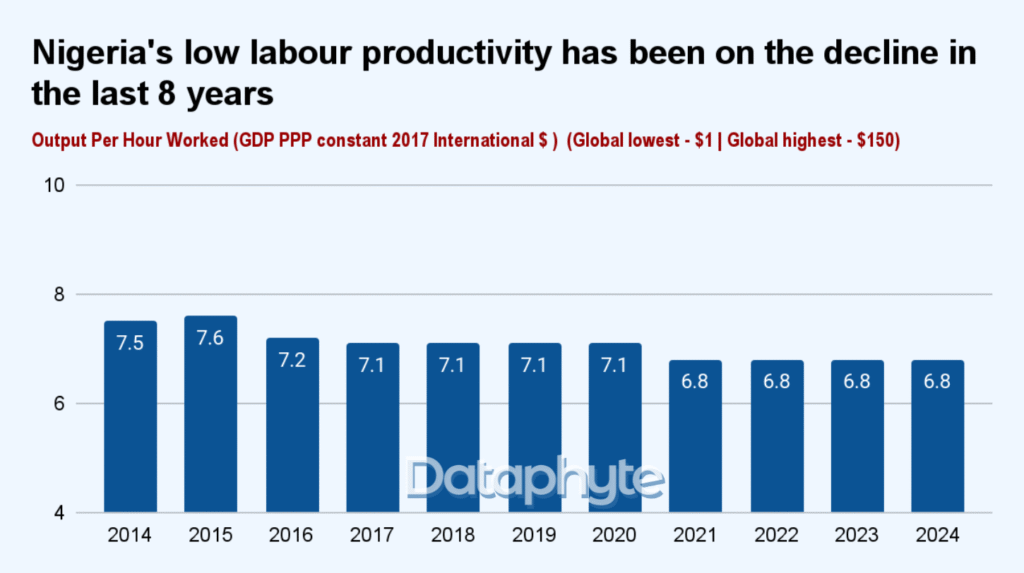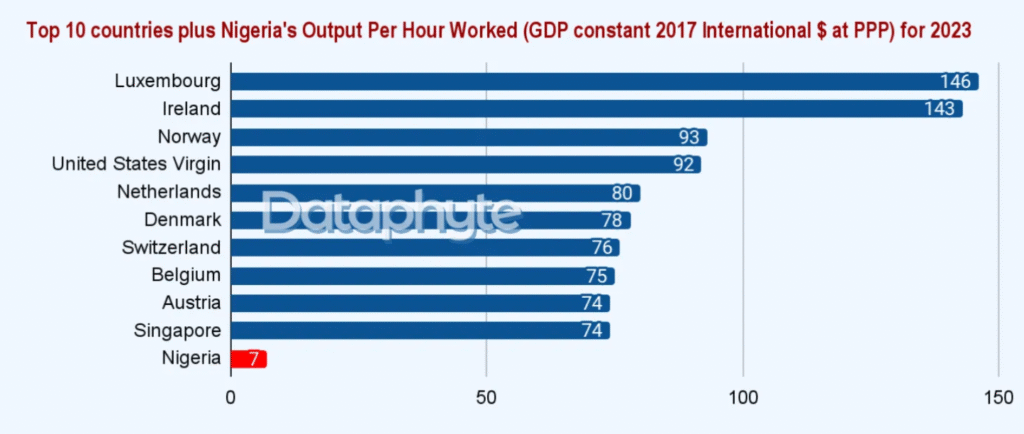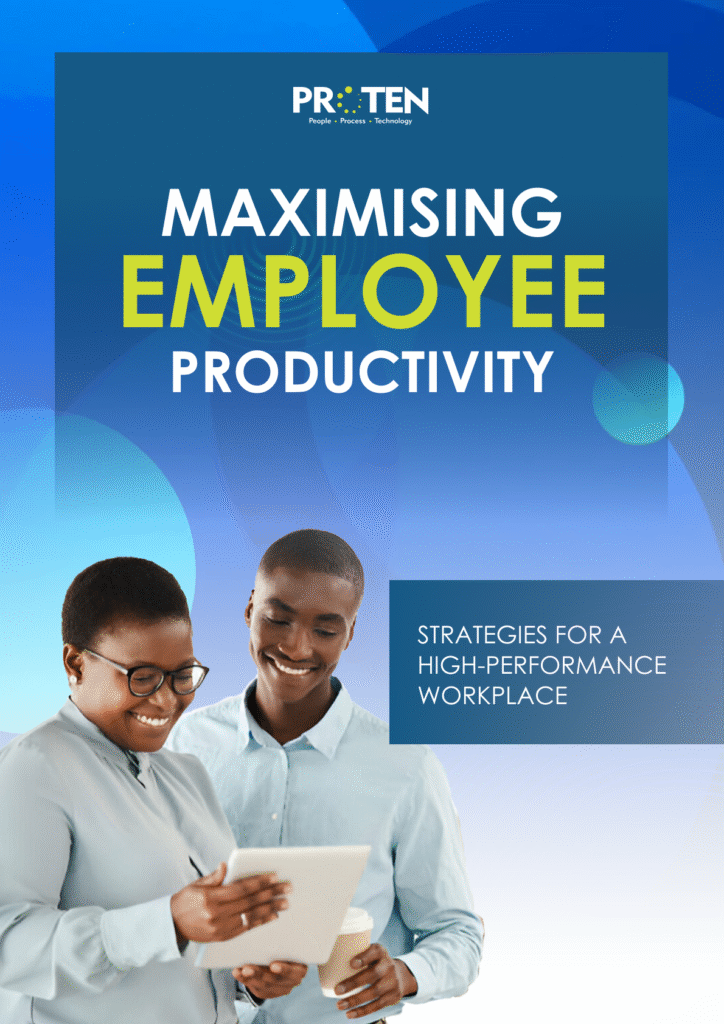
Source: International Labour Organisation
While employee productivity in Nigeria has declined over the last 8 years, it remains a critical driver of organisational success. In our dynamic and rapidly evolving corporate landscape, maximising employee productivity is essential for organisations to thrive amidst economic challenges, cultural diversity, and infrastructural constraints. When compared to the world’s most efficient societies, the output per employee in Nigeria has significant room for improvement.

Source: International Labour Organisation
The key to maximising employee output is through the creation of a high-performance workplace culture. A high-performance workplace fosters engagement, innovation, and resilience. Companies that strive to cultivate a high-performance culture possess a competitive advantage by empowering employees to take ownership of their performance and fully commit themselves to pursuing business goals and initiatives.
Over the next few pages, drawing on local insights and global research, we will explore evidence-based strategies for building a high-performance workplace, leveraging affordable technology, employee well-being, and effective performance management systems.
2. The Foundations of a High-Performance Workplace
2.1 Defining a High-Performance Workplace
A high-performance workplace is one where employees are motivated, empowered, and equipped to excel irrespective of local challenges. According to the Nigeria Employers’ Consultative Association (NECA), high-performance workplaces in Nigeria exhibit:
- Engagement: Employees are committed to organisational goals and feel a sense of purpose.
- Enablement: Employees have access to reliable tools and resources, even in resource-constrained settings.
- Resilience: Employees are supported to navigate economic and social pressures while maintaining performance.
2.2 The Business Case for Productivity
Investing in employee productivity yields significant benefits. A 2022 study by PwC Nigeria found that organisations with high employee engagement report 20% higher profitability and 50% lower turnover. Conversely, disengaged employees contribute to an estimated ₦500 billion in annual productivity losses across Nigerian businesses. By prioritising productivity, Nigerian organisations can enhance financial performance, improve customer satisfaction, and strengthen their employer brand in a talent-scarce market.
3. Strategies for Maximising Employee Productivity in Nigeria
3.1 Cultivating a Culturally Sensitive Workplace Culture
A positive and inclusive workplace culture is essential in Nigeria, where diverse ethnic, religious, and regional identities significantly influence organisational dynamics. In such a multifaceted environment, cultivating cultural sensitivity not only fosters unity but also enhances productivity. One key aspect of this is promoting psychological safety—a workplace environment where individuals feel safe to express ideas without fear of negative consequences. This is particularly important in our society, where hierarchical structures and cultural norms may hinder open communication. This is clearly illustrated in a 2021 study by the African Leadership Institute which found that teams exhibiting high levels of psychological safety were 30% more innovative.
Another crucial pillar of a thriving workplace in Nigeria is recognising and rewarding employee performance. Effective strategies include publicly acknowledging achievements in team meetings or company events, offering monetary or non-monetary incentives like extra leave or professional development opportunities, and using peer-to-peer recognition platforms. Together, these approaches help build a workplace where individuals feel valued, heard, and empowered to contribute meaningfully.
3.2 Leveraging Affordable Technology for Productivity
Enhancing workplace productivity requires the strategic adoption of accessible digital tools and automation solutions tailored to specific needs. According to a 2022 Deloitte Nigeria report, organisations leveraging digital tools experienced a 15–25% boost in efficiency. To maximise the benefits, it is important to choose affordable, cloud-based solutions that require minimal data, and provide comprehensive training to bridge digital literacy gaps.
In parallel, automating routine tasks presents a powerful opportunity to reduce manual workloads and streamline operations, particularly in high-volume sectors like banking and retail. Tools such as chatbots for customer service and software for payroll processing can significantly improve speed and accuracy. A 2023 McKinsey Africa report projects that automation could raise Nigeria’s overall productivity by 8% by 2030. To achieve this, organisations should identify repetitive tasks suitable for low-cost automation, partner with local tech startups to develop context-specific solutions, and invest in reskilling employees to transition into higher-value roles, ensuring both efficiency and sustainable workforce development.
3.3 Prioritising Employee Well-Being
Promoting work-life balance and supporting mental health are essential components of a sustainable workplace culture, where daily stressors like traffic congestion and high-pressure job demands can significantly impact employee well-being. Flexible working arrangements—such as hybrid work or staggered hours—can help ease these pressures. A 2023 Jobberman survey revealed that 68% of Nigerian employees reported increased job satisfaction when offered flexible work options.

Source: SelectSoftware
Equally important is addressing the often-overlooked issue of mental health. Despite ongoing stigma, mental health challenges cost Nigerian employers an estimated ₦200 billion annually in lost productivity, according to a 2022 NECA report. Organisations can take proactive steps by partnering with local NGOs to provide confidential counselling services, equipping managers with the skills to identify and respond to signs of stress, and running awareness campaigns to normalise mental health conversations.
3.4 Implementing Effective Performance Management
Establishing clear goals and providing continuous feedback are critical for enhancing employee engagement and performance. A 2022 study by the Lagos Business School revealed that Nigerian employees with clearly defined goals were 2.8 times more likely to be engaged at work. To make goal-setting more impactful, organisations should align individual objectives with broader strategic priorities—such as market expansion—involve employees in the process to increase ownership, and review goals regularly to remain responsive to volatile economic conditions.
Complementing this with continuous feedback can drive even greater performance improvements. Unlike traditional annual reviews, ongoing feedback allows for timely course correction and motivation.
4. Measuring and Sustaining Productivity Gains
To ensure long-term success, Nigerian organisations must measure productivity and refine strategies.
4.1 Key Performance Indicators (KPIs)
Relevant KPIs include:
- Output Metrics: Revenue per employee, sales growth rates.
- Engagement Metrics: Employee satisfaction scores, retention rates.
- Well-Being Metrics: Absenteeism rates, uptake of well-being programmes.
4.2 Continuous Improvement
Adopt a continuous improvement approach by:
- Conducting biannual employee surveys to assess engagement and challenges.
- Investing in affordable, low-bandwidth productivity tools and providing digital literacy training.
- Piloting initiatives in one business unit before scaling across the organisation.
5. Conclusion
Maximising employee productivity requires a tailored approach that addresses local challenges while leveraging global best practices. By cultivating a culturally sensitive workplace, adopting affordable technology, prioritising employee well-being, and implementing effective performance management, organisations can create high-performance workplaces that drive sustainable growth.
For organisations looking to maximise business growth, high-performance work practices represent an exciting opportunity to create a workplace culture that supports success and growth. With the right approach and support, any organisation can achieve the benefits of a high-performance workplace and create more value for all stakeholders.
How Proten International Can Help
Proten International is a leading international human resource and management consulting firm which provides a range of advisory and transformation solutions. Over the years, we have helped many organisations provide the tools and set up systems for a high-performance workplace.
Interested in learning how your workplace is supporting employees and driving your business outcomes? Contact us today, and we will help transform your workplace into a powerful driver of productivity, high performance, innovation and growth, positioning your organisation for success in an uncertain economic climate.

